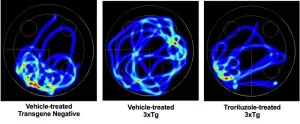(Press-News.org) AUBURN, AL — In a recent development in Alzheimer's disease research, Auburn University scientists have studied a new drug, troriluzole, that can prevent brain changes leading to memory loss and cognitive decline in a mouse model of the disease. This study, recently published in the Journal of Neurochemistry, is the first to show how troriluzole can target early-stage alterations associated with Alzheimer’s, providing new hope for potential treatments.
Dr. Miranda Reed, a Professor in the department of Drug Discovery at Auburn University and Delivery and the studies main researcher, noted that “by examining how drug treatments can intervene early in the disease process, we aim to develop therapies that might prevent or even cure Alzheimer’s.” “This study also highlights how scientific advancements can transform our understanding of complex diseases like Alzheimer’s,” said Dr. Michael Gramlich, an Assistant Professor of Biophysics and the study's other main researcher.
Breaking New Ground in Alzheimer’s Research
Alzheimer’s disease affects millions of people worldwide, causing progressive memory loss, confusion, and eventually the inability to perform basic tasks. Despite decades of research, a cure remains elusive. Alzheimer’s is characterized by the accumulation of amyloid plaques and tau tangles in the brain, which disrupt neural communication. In the early stages, excessive levels of the neurotransmitter glutamate cause damaging overactivity in synapses, the connections between nerve cells.
The study conducted by Auburn University researchers, led by Drs. Miranda Reed and Michael Gramlich, investigated how troriluzole, a novel drug, can maintain normal brain function in mice genetically modified to replicate early Alzheimer’s stages. The results are compelling: troriluzole not only reduced harmful glutamate levels but also improved memory and learning in the mice, suggesting a maintenance of healthy brain function.
“Our research demonstrates that by targeting synaptic activity early, we may be able to prevent or slow the progression of Alzheimer’s. This could revolutionize the way we approach treatment for this disease,” noted both researchers.
How Troriluzole Works
In the Auburn study, mice treated with troriluzole showed a significant reduction in synaptic glutamate levels and decreased brain hyperactivity. These molecular changes led to tangible improvements: the treated mice performed better in memory tests, such as navigating mazes, indicating that their cognitive functions were restored.
“These findings are promising because they suggest that troriluzole can protect the brain at a fundamental level, starting with molecular changes and resulting in improved cognitive abilities,” said Dr. Reed. “It’s like repairing an engine before it fails completely.”
A Collaborative Effort with Wide Implications
This research was a collaborative effort involving Auburn University’s College of Science and Mathematics, the Harrison College of Pharmacy, and the Center for Neuroscience Initiative, along with private researchers and students. The team's combined expertise in neuroscience and pharmacology was crucial to the study's success.
“This collaboration blends basic science and pharmaceutical research to tackle one of the most challenging neurological issues of our time,” Dr. Gramlich emphasized. “Our work not only enhances scientific understanding of Alzheimer’s disease but also offers a potential new treatment that could improve the lives of millions worldwide.”
What’s Next?
While the results in mice are encouraging, the researchers emphasize the need for further studies to determine how troriluzole works at different stages of disease progression.
END
Auburn researchers show novel drug rescues memory loss in Alzheimer’s mouse model
New research from Auburn University reveals a potential breakthrough in Alzheimer’s treatment, showing that the drug troriluzole can reverse memory loss and cognitive decline in mice.
2024-09-04
ELSE PRESS RELEASES FROM THIS DATE:
Study at Pennington Biomedical Research Center to evaluate THC, CBD benefits for dementia-related agitation
2024-09-04
Pennington Biomedical Research Center’s Dr. Jeff Keller is evaluating the potential for delta-9-tetrahydrocannabinol, or THC, and cannabidiol, or CBD, to reduce the behaviors indicating agitation, distress or anxiety in patients with Alzheimer’s disease or other forms of dementia. The study is designed for hospice-eligible patients who are either receiving hospice care or who are eligible for hospice, and who are exhibiting agitation concurrently with a diagnosis of dementia. There are currently no FDA-approved medications to treat agitation at the end-of-life stages in dementia patients.
The “Life’s End Benefits of Cannabidiol and ...
Illinois scientists to test modernized genetic model for optimized crop breeding
2024-09-04
URBANA, Ill. — The National Science Foundation (NSF) has funded University of Illinois Urbana-Champaign research that aims to connect the dots between quantitative and molecular genetics and improve crop breeding.
The four-year, $795,000 grant investigates new theories on how genetics influence complex crop traits, such as yield or grain quality. These traits are controlled by lots of different genes — sometimes hundreds or thousands — which makes untangling their contributions difficult. Crop breeders use a host of advanced genetic tools to predict and ...
Adolescent glioma subtype responds to CDK4/6 inhibitor
2024-09-04
Boston – CDK4/6 inhibitors, which are already FDA approved for the treatment of other forms of cancer, show early signs of promise in the treatment of a subtype of pediatric high-grade glioma, according to new research from Dana-Farber Cancer Institute and the Institute of Cancer Research in London. Treatment of a patient with a second relapse of this glioma subtype and no other treatment options resulted in 18 months of progression-free survival.
“We are finally starting to see more targeted therapies come out for different forms of brain cancer,” says senior author Mariella Filbin, MD, PhD, co-director ...
Study highlights importance of social media influencers in information dissemination during mpox outbreak
2024-09-04
A recent study shows social media influencers are more important than previously thought when it comes to getting out vital information in a crisis.
The study suggested partnerships that could improve public communication between governments, non-profits and social media influencers during crises. The study, conducted by UF/IFAS assistant professor Kimberly Kay Wiley, a researcher in the family, youth and community sciences department, and Bridgewater State University associate professor Seth Meyer, shows how these groups can collaborate to effectively disseminate information and manage public health emergencies on social media.
“In ...
Ability to cope well with adversity in older age linked to lower death risk
2024-09-04
The ability to cope well with, and adapt to, challenging life circumstances and events in older age is linked to a lower risk of death, suggests a large nationally representative study, published in the open access journal BMJ Mental Health.
The findings underscore the importance of efforts to bolster mental resilience, conclude the researchers.
The available evidence suggests that mental resilience is a dynamic and active process influenced by various factors, including sex, hormones, and the genes regulating ...
Number of general practices shrinking but patient lists ballooning in England
2024-09-04
Over the past decade the number of NHS general practices in England has shrunk by 20%, but patient list sizes have expanded by 40% to just under 10,000, on average, finds an analysis of three national primary care datasets, published in the open access journal BMJ Open.
And while the total NHS general practice workforce grew 20% between 2015 and 2022, as a result of increases in admin staff and other practitioners, the number of GPs per 1000 patients fell by 15% over the same period, when accounting for working hours, the analysis shows.
Major structural and organisational changes have taken place in general practice in England over the past decade,but it’s difficult ...
Women, Black people, and disadvantaged less likely to get heart surgery in England
2024-09-04
Women, people of Black ethnicity, and those from low income households in England are less likely to be offered heart surgery than men, White people, and those who are affluent, finds research published online in the journal Heart.
And when they do have these procedures, they are more likely to die within a year, prompting the researchers to call for prompt action to tackle these health inequalities.
Cardiac surgery is one of the costliest ways of treating cardiovascular disease, with around 28,000 adults a year in the UK undergoing the procedure, note the researchers. While previously published research shows that gender, ethnicity, and social/economic deprivation can affect ...
A sensory pen which can read Braille could improve literacy amongst the visually impaired
2024-09-04
A pen which can transform Braille into English text has been developed by experts at the University of Bristol.
Braille literacy is frequently reported as being in decline, this is despite visually impaired people often expressing a desire to learn it, and Braille literacy being a highly valued skill by those who are capable. This is often attributed to the lack of available learning resources, particularly away from large urban centres.
The handheld device, which includes a one-centimetre sensor with 19 channels programmed to read Braille, has demonstrated high accuracy in early trials.
Lead author Dr George Jenkinson ...
AI tool offers more accurate detection of immune-related adverse events in cancer patients
2024-09-04
While immune checkpoint inhibitors (ICIs) can provide lifesaving treatment for patients with cancer, they have also been found to cause immune-related adverse events (irAEs) — side effects that can impact almost every organ in the body to varying degrees. The frequency and severity of irAEs in real-world datasets are not well understood, making it difficult to combine cases effectively across institutions and gain insights into the optimal management of these patients. Since current approaches to investigate irAEs are done manually and are inefficient, researchers from Mass General Brigham have incorporated the use of a prebuilt large language ...
Applications open for ISSCR Lawrence Goldstein Science Policy Fellowship
2024-09-03
The ISSCR is accepting applications through 25 October 2024 for the next class of Lawrence Goldstein Science Policy Fellows. The three-year program offers fellows advocacy and public policy training, the opportunity to participate in ISSCR advocacy events, engagement with leaders in the field, and an ex officio seat on ISSCR’s Public Policy Committee.
Goldstein Policy Fellows also have the opportunity to:
Attend ISSCR’s Congressional Advocacy Day in Washington D.C. or a policy- related event in another region of the world.
Participate in regularly scheduled Public Policy Committee meetings.
Assist the committee and ISSCR policy staff with projects and programs.
Contribute ...
LAST 30 PRESS RELEASES:
Four NYU faculty win Sloan Foundation research fellowships
Personal perception of body movement changes when using robotic prosthetics
Study shows brain responses to wildlife images can forecast online engagement — and could help conservation messaging
Extreme heat and drought at flowering could put future wheat harvests at risk
Harlequin ichthyosis: a comprehensive review of pathogenesis, diagnosis, and management
Smithsonian planetary scientists discover recent tectonic activity on the Moon
Government censorship of Chinese chatbots
Incorporating a robotic leg into one’s body image
Brain imaging reveals how wildlife photos open donor wallets
Wiley to expand Advanced Portfolio
Invisible battery parts finally seen with pioneering technique
Tropical forests generate rainfall worth billions, study finds
A yeast enzyme helps human cells overcome mitochondrial defects
Bacteria frozen in ancient underground ice cave found to be resistant against 10 modern antibiotics
Rhododendron-derived drugs now made by bacteria
Admissions for child maltreatment decreased during first phase of COVID-19 pandemic, but ICU admissions increased later
Power in motion: transforming energy harvesting with gyroscopes
Ketamine high NOT related to treatment success for people with alcohol problems, study finds
1 in 6 Medicare beneficiaries depend on telehealth for key medical care
Maps can encourage home radon testing in the right settings
Exploring the link between hearing loss and cognitive decline
Machine learning tool can predict serious transplant complications months earlier
Prevalence of over-the-counter and prescription medication use in the US
US child mental health care need, unmet needs, and difficulty accessing services
Incidental rotator cuff abnormalities on magnetic resonance imaging
Sensing local fibers in pancreatic tumors, cancer cells ‘choose’ to either grow or tolerate treatment
Barriers to mental health care leave many children behind, new data cautions
Cancer and inflammation: immunologic interplay, translational advances, and clinical strategies
Bioactive polyphenolic compounds and in vitro anti-degenerative property-based pharmacological propensities of some promising germplasms of Amaranthus hypochondriacus L.
AI-powered companionship: PolyU interfaculty scholar harnesses music and empathetic speech in robots to combat loneliness
[Press-News.org] Auburn researchers show novel drug rescues memory loss in Alzheimer’s mouse modelNew research from Auburn University reveals a potential breakthrough in Alzheimer’s treatment, showing that the drug troriluzole can reverse memory loss and cognitive decline in mice.





